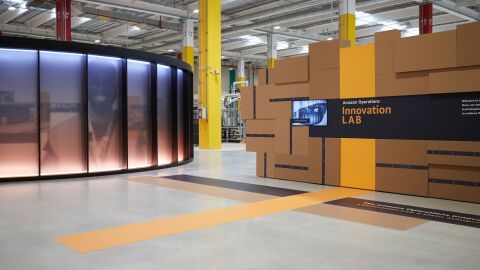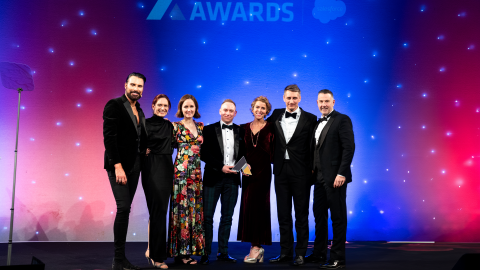Be the Business is a movement to drive up UK productivity and competitiveness and works to inspire and improve every firm in the country. Set up at the end of 2017 and led by a Board of industry leaders including our UK Country Manager, Doug Gurr; Chairman of the John Lewis Partnership, Sir Charlie Mayfield and Director General of the CBI Dame, Carolyn Fairbairn - the Board came together at our UK head office to discuss how to supercharge the campaign in 2019 and beyond.
“We are building a movement of businesses hungry to improve their performance” said Tony Danker, CEO of Be the Business. “If we can raise the competitiveness of every company in the UK by a small amount, it will add billions to the UK economy and raise living standards across the country.”
Amazon has backed Be the Business from the beginning, housing the organisation at one of our London offices and offering up senior executives for the movement’s Mentoring for Growth Programme which supports ambitious small and medium sized businesses. The programme has already paired up 180 mentors and mentees with the ambition to create 1,000 relationships by March 2020.
Enhancing UK productivity will be the biggest positive change in the British economic landscape in decades, allowing the country to fulfil its potential and compete on the global stage. All the experience shows categorically that when they become more productive, British businesses raise their sights and recognise that they are ready to compete not just with their local or regional peers, but globally. The journeys to productivity and competitiveness are one and the same - at the level of the firm, region and nation.
Why does boosting productivity matter?
Productivity – how much a person produces per hour worked is the most sustainable way to increase living standards and wages. In recent years UK employment has hit record levels but productivity growth has remained persistently low. However, SMEs that have benefitted from Be the Business programmes are evidence that making small changes can deliver impressive results.
One challenge Be the Business is trying to crack is how to get more businesses to adopt performance enhancing technology. Research shows that firms which adopt basic technology like cloud accounting, customer relationship management systems and e-commerce like Amazon Marketplace see significant productivity improvements. We are supporting this work by hosting a series of SME roundtables to better understand the barriers to adopting and getting the most out of technology.
Many of Be the Business’s greatest successes have been in regions like Cornwall and the North-West of England that have historically underperformed, as well as in sectors like hospitality and retail that have huge potential (and are mass employers).
One company helped by Be the Business is Cumbria Crystal. Located in Ulverston, Cumbria Crystal is the last producer of completely hand-blown and hand-cut English crystal in the United Kingdom. Using only traditional glassmaking processes, the small team of highly skilled artisans make crystal of the highest quality using techniques and processes that have hardly changed since the Roman era.
Chris Blade, the Managing Director took part in the Productivity through People programme, run in partnership by Be the Business, Lancaster University and leading UK firms. Chris used Be the Business’s benchmarking tools for his firm, which has led him to introduce changes in his business that have led to big improvements to his bottom line. They include a staff bonus scheme for hitting turnover and margin targets and working with Lancaster University engineering department on 3D-printed moulds that enable the business to reduce costs and develop prototypes more quickly.
The success led his business to win contracts with Downton Abbey and other major film and TV productions with any crystal products displayed on screen.
“With Brexit just around the corner, every business owner in the country will be looking at how they will compete in years to come. Businesses can get better by following and taking inspiration from the businesses that lead the way” says Tony Danker. “That’s why it’s great that some of the UKs leading firms are sharing their experience with businesses that are keen to improve.”











